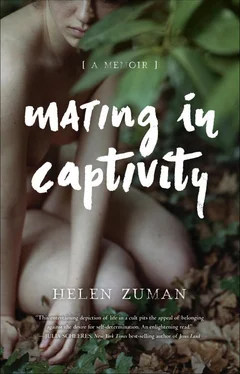The original invitation to ascend to the Farmhouse had been issued exclusively to Luya. But she’d demurred, insisting to the other women that they’d lose me if they didn’t bring me in from the barn. Though it’s hard to imagine a Zendik Apprentice exerting pressure on Kore Apprentices and Kore members, she did win me a space in the Farmhouse by refusing to move without me.
By this time, the upstairs room was no longer a loft; a wall had replaced the railing. Still, there was no room for an extra bedstead. So I was given a plywood platform, maybe eight by eight feet, under the ceiling—a tiny, nosebleed A-frame, installed just for me. For some reason, I called it my bat cave. To reach my cave, I climbed a ladder that one of the carpenters had fashioned from two-by-fours. To conserve floor space, he’d made it strictly vertical. I had to watch my step to avoid falling off.
At its peak, my bat cave gave me only about four feet of headroom. I didn’t want to shrink this with a mattress. And I didn’t mind lying on hard surfaces. So I rolled my sleeping bag out on the plywood. My new roommates made good-natured fun of my ascetic bent: “She sleeps on a board ,” they said.
When I lay on my back and looked up, I saw a swarm of ladybugs. Hundreds of them. They’d made a home in the seam at the peak of the ceiling. They smelled like steam-heated iron filings. I watched with a mix of fascination and revulsion the scurry and pulse of their communal life. Sometimes they lost their grip; I never got used to the tiny plunk of a bug on my face as I waited for sleep. But I did make peace with their presence. I did come to appreciate their fecundity, their vigor, their industry.
When I sat up on my board and looked out, I saw Jayd. Her bat cave, at the far end of the room, was the mirror image of mine. There couldn’t have been less than ten feet between our two ladders, yet, in my memory, she’s so close I can see the sparkles in her lavender nail polish. Through no fault of her own, her nearness oppressed me.
Jayd, seventeen, had been at the Farm about a year, to my month and a half. She wore the brown wristband of the Kore Apprentice and regularly went selling. She was unusually young for a Zendik, but she wasn’t the only one who’d exchanged a chaotic life on the street, or a struggle with drugs, or an abusive family, for the relative calm and security of the Farm. Zar, a Family member who’d fathered Arol and Wulf’s first grandchild, had left his LA street gang for Zendik at sixteen. Zar’s current girlfriend, Donna, had been the same age when she’d hitched a ride back to the Farm with a selling crew she’d met at a Phish show.
Jayd may have mentioned the skirmish with despair and suicide that had driven her to Zendik. If she had, it hadn’t roused my empathy. Privately, spitefully, I condemned her languor on work crews, her dyed-black hair (wasn’t hair dye of the Deathculture?), her adenoidal intonation—when really what bugged me was her closeness to Estero.
If I knew of their interest in each other before hitting on him, I dismissed it. The Zendik dating game encouraged players to switch partners, with its one-night limit. It was only after our walk that I sat up and took notice. How could I maintain my fantasy that he was as smitten with me as I was with him, when he kept hitting on Jayd?
In some other milieu, I might not have persisted (I might not have pursued Estero in the first place). But Zendik had twisted my mating story into a psychedelic swirl. In an essay called “Couples in Ecolibrium,” Wulf advised against depending on any one person to meet every emotional need. While he admitted that a member of a Zendik couple might “[w]ant to sleep with that person, nobody else, want to have sex with that person, nobody else, want to have children with that person, nobody else,” he warned that “then they might want to be totally intimate with that person, nobody else. That’ll never work. They must commit to being totally intimate with the group, be total Zendiks in Ecolibrium.” Elsewhere he said, “Love is interest, Love is attention, Love is fascination—fascination with the Love object—such fascination that there can be no place for the competitive attitudes and actions of rivalry, envy, jealousy.” So dyads threatened the tribe, and what I felt for Estero must not be Love with a capital “L,” since I was finding plenty of room for envy. How was I to coax a plot from this pulsing spiral of doctrine and desire?
One evening a week or so after that first walk, my frustration burst into words. Loria had just told me that Estero had refused my second hit-up, as he was already set to get together with Jayd. Blood rushed to my cheeks, crushing my guard. “I don’t know what to do,” I said. “I get so jealous whenever I see him with her or hear they’re having a date. My instant reaction is, ‘I hate her.’”
In the bathroom, the shower hissed on. Loria pursed her Marilyn Monroe lips and tucked a blond curl behind her ear. “You have to develop a revolutionary attitude toward relationships,” she said. “Jealousy is just a conditioned reflex. It’s how people react in a competitive culture. Here, you can relax.” She paused. I nodded. “Ideally your interest in Estero would bring you and Jayd together. It’s something you have in common. Why not use it as a starting point for friendship?” She smiled, flashing her broad band of perfect teeth. “Why not talk to her about it?”
Because I would feel horribly embarrassed. Because she might not want to talk to me.
A savvy girlfriend in the outside world might have advised me to forget Estero and find a guy who liked me. But Loria—a Family member who’d spent more than a decade at the Farm, and years as Wulf’s lover—had grown used to the contortions born of conforming your longings to another’s ideal. The ideal we were thrashing toward had been conceived by Arol and Wulf and encoded in Zendik’s own creation myth.
Carol Merson met Wulf Zendik (formerly Lawrence Wulfing) in Los Angeles in 1962, when she was twenty-three and he was forty-two. She’d just landed a part in a new TV series; he was writing fiction and poetry and dreaming of a lifelong partnership based on complete honesty. “In a square, old Society relationship,” he wrote, “you can’t even get to know each other because the other person is so valuable as a possession, as a shield against the madness and the insanity of the Deathculture. Everything is a defense against a hateful society… that is out to do you in.” Enthralled by his vision and brilliance, and the promise of a life immersed in Love and Art, she ditched the acting job to be with him. She dropped the “C” from her first name and took the last name Wulf.
The two began playing music at clubs and cafes in LA. (Wulf, a seasoned performer, taught Arol to play along.) But the gigs didn’t pay much. So Arol took up exotic dancing to cover food and rent—even though the late nights left her with little time or verve for art. Seeing that plenty of other artists were also struggling to get by, they imagined convening a tribe to share the burden of survival—a supportive social matrix in which people could do work they cared about, own and meet their true needs, and join Wulf and Arol in their quest to be honest. By this time, they’d realized that they could achieve complete honesty as a couple only within a community that shared their ideal.
Wulf’s parents offered him and Arol the use of a ranch they owned in the high desert east of Los Angeles. They could do as they pleased with the place, as long as they maintained it and kept the taxes paid. In 1969, the pair relocated to the ranch and began to attract would-be communards from far and wide. They started growing their own food and formed a band that toured nearby colleges. Zendik Farm was born.
Читать дальше











